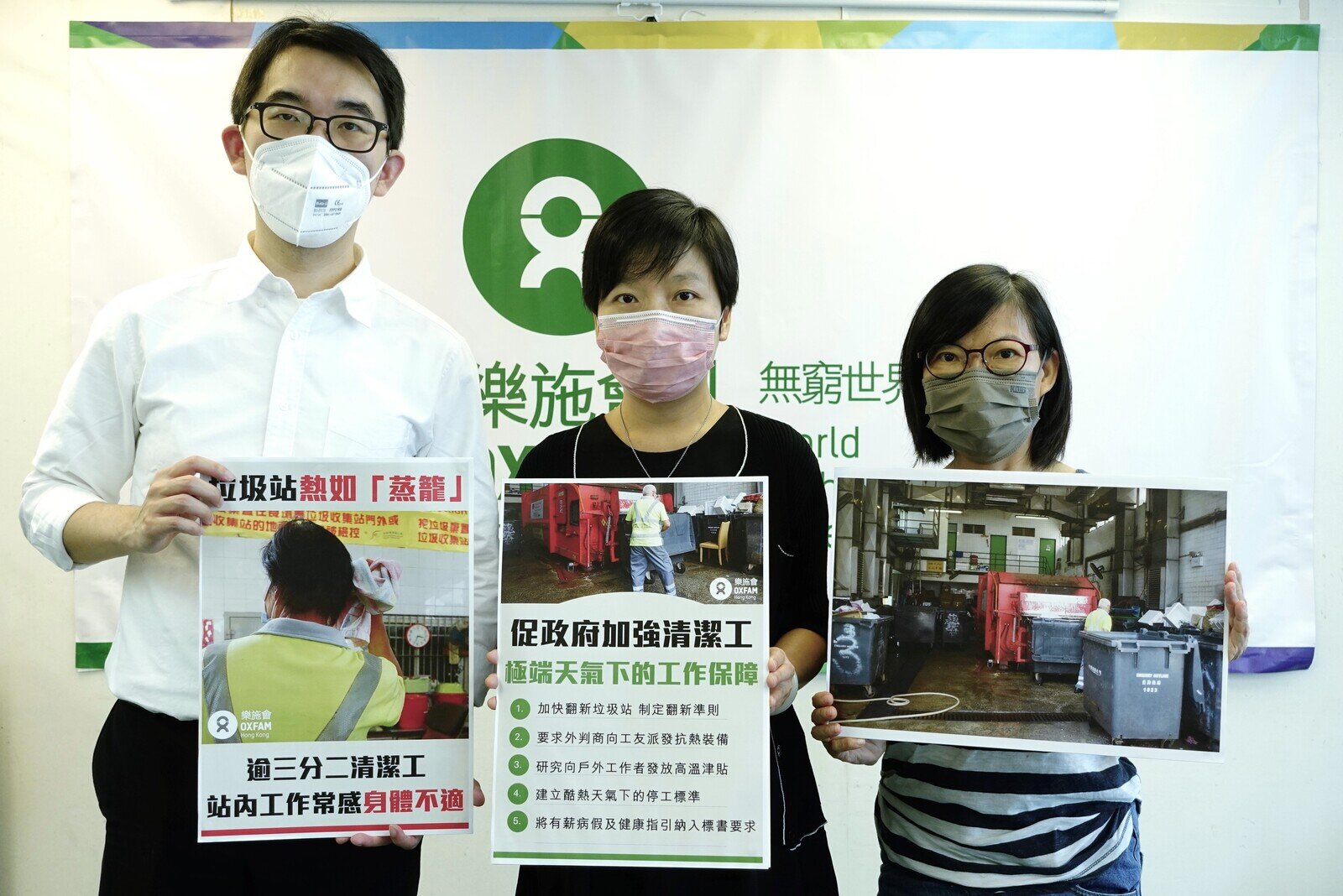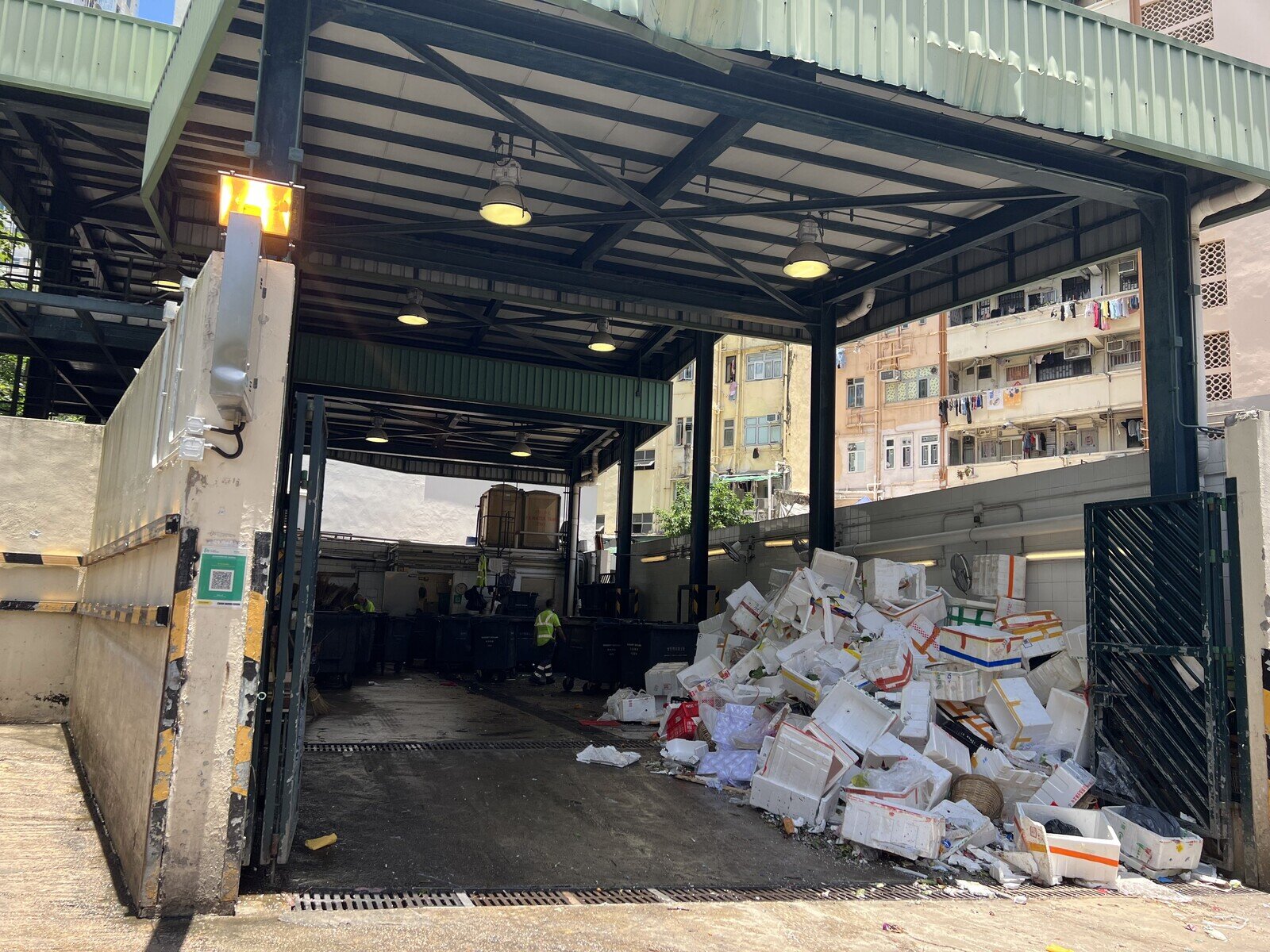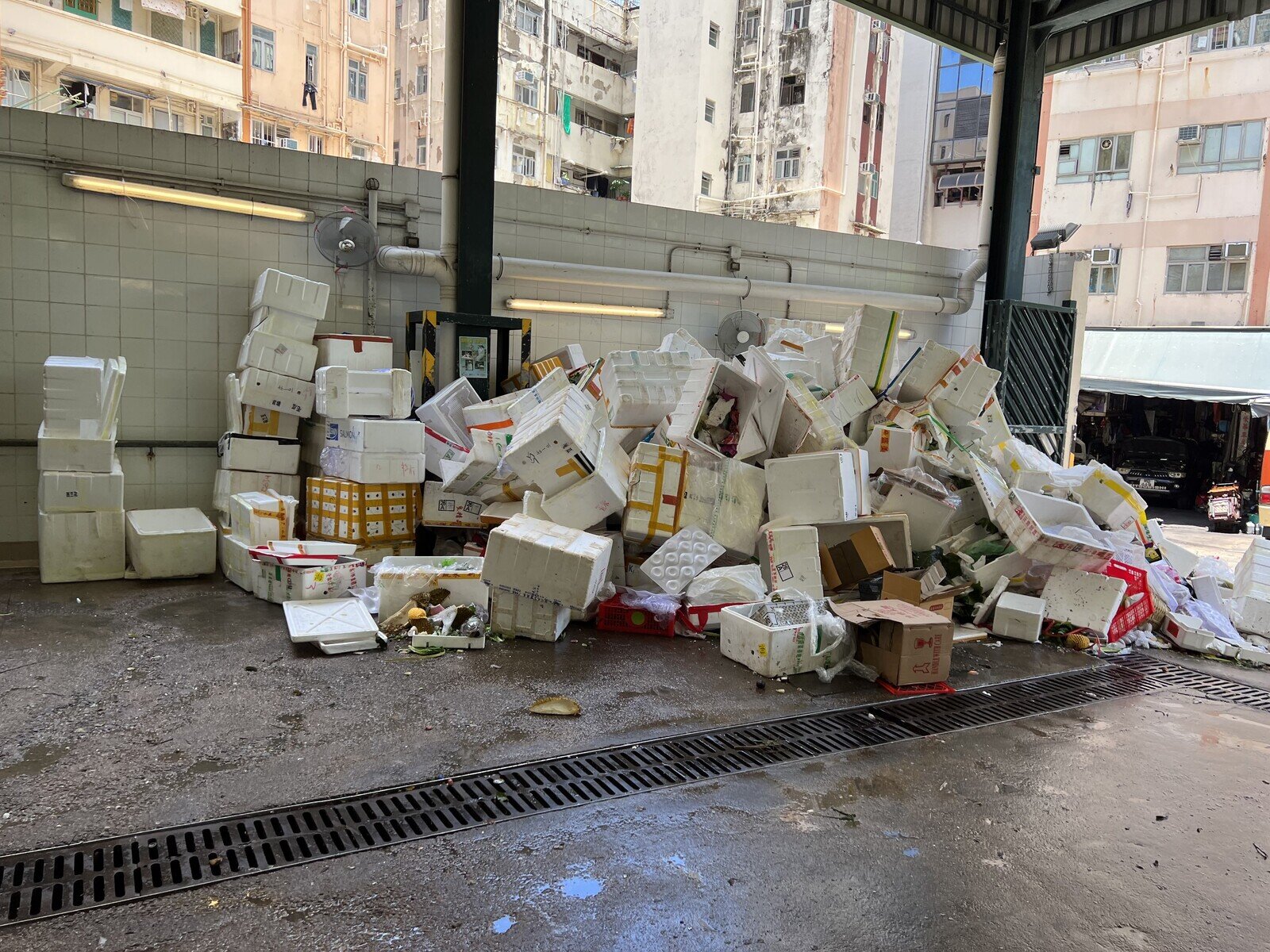29 AUG 2022
Extreme heat at refuse collection points leave two-thirds of sanitation workers unwell
Oxfam Hong Kong urges government to consider granting high temperature subsidies and establishing labour standards for extreme heat
The effects of climate change are becoming increasingly pronounced in Hong Kong. The Hong Kong Observatory announced record-breaking high temperatures in July 2022, which directly affected the well-being of outdoor workers. Today, Oxfam Hong Kong (OHK) published its study ‘Sanitation Workers’ Working Conditions at Refuse Collection Points (RCPs) in Extreme Heat’. The research findings show that the average temperature at RCPs is 32°C, which is even higher than the average temperature outdoors. More than 65 per cent of interviewees said they always feel unwell when they work at RCPs because of the stifling heat and poor ventilation. Some sanitation workers pointed out that resting areas in renovated and newly-built RCPs are still insufficient, which shows that departments responsible for the upgrades have failed to meet workers’ needs and offer them a place to stay cool and rest. OHK believes it is necessary to separate working and resting areas, and urges the government to establish clear and objective guidelines on when work needs to cease in extreme heat in order to protect workers’ health.
Wong Shek-Hung, Director of Hong Kong, Macau, Taiwan Programme at OHK said, ‘Not only are sanitation workers exposed to the scorching heat when working outdoors, they also lack a suitable space that allows them to rest and cool down.’ The government's current measures to tackle climate change focus on emissions reductions, but what is urgently needed are climate adaptation measures related to the most vulnerable people so they can adapt to it now. That is why OHK will distribute portable neck/waist fans to 4,000 sanitation workers. This will be done to enhance their ability to adapt to climate change and reduce their risk of suffering from heat-related illnesses.
OHK commissioned the Social Policy Research Institute to survey 200 outsourced sanitation workers from the Food and Environmental Hygiene Department (FEHD) from June to July 2022 and conduct in-depth interviews with another six sanitation workers from different districts across Hong Kong. Almost 70 per cent of interviewees were aged 60 or above, and more than 30 per cent worked in renovated or newly-built RCPs.
The research team found that the average temperature inside RCPs was as high as 32.2°C, which was even higher than the record-breaking average temperature in July 2022 (30.3°C). Ninety per cent of interviewees worked inside RCPs, and over two-thirds (67 per cent) felt physically unwell when working at RCPs, including renovated and newly-built ones. Two-thirds (66 per cent) attributed feeling unwell to the hot and humid environment, as well as the poor ventilation. Further, more than a quarter (27 per cent) of interviewees who worked in renovated or newly-built RCPs considered pests a major reason for feeling unwell. The proportion is noticeably higher than that of interviewees working at old RCPs (18 per cent), which indicates that newly designed RCPs are relatively incapable of preventing pests.
According to the Labour Department’s ‘Prevention of Heat Stroke at Work in a Hot Environment’, employers should ‘arrange employees to rest regularly in a cool or shady place during very hot periods’. However, OHK’s study shows that almost two-thirds (64 per cent) of interviewees were not protected according to the guide. Half of the interviewees also found it difficult to rest inside RCPs. One-sixth (16 per cent) attributed this to the lack of resting space, while 30 per cent and 41 per cent respectively attributed this to the poor hygiene and stifling heat. Most of the workers (78 per cent) said they could only find cooler areas outside, which has led members of the public to misunderstand and accuse them of being lazy at work.
And although the Guide states that employers should provide sanitation workers with drinking water and hats, 43 and 13 per cent of interviewees were not provided with drinking water and hats respectively. It is clear that some employers did not follow the guidelines, however, the Labour Department also did not carry out inspections that were frequent or adequate enough to enforce them.
Further, 44 per cent of interviewees said their company did not arrange any occupational safety trainings or workshops for them, while 35 per cent said they did not know about the Labour Department and Occupational Safety and Health Council’s ‘Guide for Occupational Safety and Health’. The current policy on heat prevention is clearly inadequate, and the lack of awareness of occupational safety has increased workers’ risk of suffering from heat stroke and other heat-related illnesses.
Case Studies:
- Ms. Tang (46 years old) — works at an RCP; duties include cleaning RCP, handling waste and refuse, operating refuse compactor, and cleaning toilets inside RCP
Ms. Tang works ten hours a day (includes her hour-long lunch break) inside an RCP. Although industrial fans are installed inside the RCP, she still feels unwell because of the stifling heat at work. ‘There are no ventilation fans in this station; and even though there are industrial fans, they do not face us. We also need to walk around while we are working, so we hardly feel the wind,’ said Ms. Tang. She continued, ‘Nobody can fill in for us if we aren’t there. Whenever people bring their garbage here, we have to handle it.’ She went on to tell us how tiring it is to work continuously for several hours in these conditions: ‘I sweat buckets and feel extremely tired at work. Sometimes I don’t even feel hungry because I lose my appetite from exhaustion.’ - Fong (pseudonym, 55 years old) — responsible for sweeping the streets
Fong usually avoids going to the RCP outside of lunch hours: ‘It’s very hot there even though there are five to six fans. It’s really stuffy and the smell of trash is trapped inside.’ Worse still, not only can Fong not rest properly inside the RCP, she has also had some of her belongings stolen there in the past: ‘They even took my mug!’ All of this has forced Fong to rest outdoors, which puts her at risk of receiving complaints. But she said, ‘I have no choice, I can’t think of a better way around these issues.’
The government – as the largest employer that has hired the most sanitation workers through outsourcing – has the duty to safeguard workers’ safety and rights. To this end, OHK urges it to do the following:
- Speed up RCP renovations and establish specific criteria and timetable
When renovating or building new refuse stations, authorities must formulate and strictly adhere to criteria to improve the spaces, and must set a timetable for the renovations throughout the territory. After conducting in-depth interviews with sanitation workers, OHK believes it is necessary to set up resting areas that are separate from working areas in every RCP. OHK recommends setting up cooling facilities (e.g. air conditioners with a ‘Grade 1’ energy label), deodorisation systems (e.g. independent sewage treatment system, water scrubber system, air filtration/purifying systems), small appliances commonly found in staff lounges (e.g. water dispenser, microwave, and refrigerator), sufficient toilets and changing rooms, etc.
For RCPs that are relatively small, OHK recommends searching for vacant land nearby and setting up a separate resting area. The responsible department should also consult sanitation workers and consider their actual needs when designing new RCPs. - Require contractors to provide equipment to keep workers cool
The provision of equipment to keep workers cool in extreme heat (including portable fans, arm sleeves, towels/cooing towels, sun hats, etc.) should be included in the Guide. Contractors should be required to provide the aforementioned products, in order to enhance sanitation workers’ ability to adapt to climate change, and reduce their risk of suffering from heat-related illnesses. - Consider providing high-temperature subsidies for outdoor workers
Mainland China and other Asian countries grant subsidies to outdoor workers when temperatures reach a certain point. Doing this not only compensates workers for additional expenses they need to cover to cool off and prevent heat stroke, but also protects their safety, health and rights. - Establish clear and objective guidelines on when work should cease in extreme heat to safeguard workers’ health
OHK published its ‘Research report on the impacts of extreme heat on street cleaners in Hong Kong’ last year. Since then, it has been urging the government to establish a heat index or other objective standards to indicate when work should be stopped in extreme heat in order to reduce workers’ risk of suffering from heat stroke. Recently, the government has shown a positive attitude towards establishing the index. Apart from measuring the air temperature though, OHK believes the index should also take humidity, air ventilation, indoor temperature and such into consideration to safeguard workers’ rights in a more comprehensive manner. Moreover, government departments should set standards for when work should cease based on the index. If contractors refuse to follow the guidelines, they should be penalised and have points deducted from their overall score, which would affect their chance of winning future tenders. - Make Occupational Safety and Health Guide and paid sick leave mandatory requirement in outsourced tendering
During the in-depth interviews, some workers mentioned that they have had to continue to work in extreme heat despite feeling unwell so that they would not have to take time off and thus earn less. As such, OHK urges the government to make following the Occupational Safety and Health Guide and offering paid sick leave mandatory requirements in outsourced tendering documents. Systemic changes like these would better safeguard workers’ rights, and enhance their ability to adapt to climate change. It would also allow contractors to take these costs into account before submitting a tender. And in order to prevent noncompliance, companies that fail to enforce the Occupational Safety and Health Guide or offer paid sick leave would receive a point deduction in the demerit point system.
- Ends -
About Oxfam
Oxfam is a global organisation committed to creating a world without poverty through its advocacy, development and humanitarian work.
For media enquiries, please contact:
| (For English) Samantha Wong Senior Communications Officer Tel: 3120 5281 Email: [email protected] | (For Chinese) Roni Chan Communications Officer Tel: (852) 3120 5222 Email: [email protected] |










